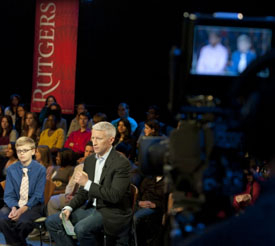Students at Anderson Cooper 360° taping moved and disturbed by this all-too-familiar national problem

CNN turned the Livingston Student Center into a TV studio for its Town Hall on bullying, with more than 50 Rutgers students in the audience.
They were tormented at school with slurs and physical abuse. Middle schoolers urinated on one boy in a bathroom stall. Another child felt like classmates wanted to “throw me away like garbage.’’
As Rutgers student Chris Jones sat in the studio audience of Anderson Cooper’s CNN special on bullying, which was taped at Rutgers on Wednesday, he wanted to console children who told their stories on stage. Their experiences were painfully familiar to him.
“I wanted to hug them and tell them, ‘I know where you’re coming from,’’ said Jones. “I wanted to tell them that really, it does get better.’’
Jones, a junior who transferred to Rutgers last year, was bullied at his high school, where he came out as an openly gay student. He was also targeted at the small Pennsylvania college he attended before switching to Rutgers-New Brunswick this year.
After the taping, Jones said he was glad that Cooper is devoting a five-day series to bullying and had enlisted celebrity guests like Kelly Ripa, “Dr. Phil” McGraw, and actress Jane Lynch of Glee, who appeared on the show.
“It’s so great that they stood up to say. ‘It’s not okay,’’ Jones said. “It’s empowering that finally someone is doing something.’’
The Anderson Cooper 360° special premiered Sunday, October 9, on CNN and will re-air on October 14 at 8 p.m. and 10 p.m. The Rutgers episode was the first installment of a weeklong series called “Bullying: It Stops Here,'' which explores the causes and effects of bullying and aims to help families and educators better understand the scope and severity of the problem.
Alana Milch, one of more than 50 Rutgers students in the audience during the taping, hoped the show would give young people the courage to speak out. “I think anything that can get the message across that we’re not going to take this anymore is progress,’’ she said. “It’s a topic that really needs to be discussed.’’
CNN web producer Ella Chick, a Rutgers alumna who worked on the show, was impressed by the student audience’s sensitivity and commitment. “I felt proud to come back and see students who care so deeply about an issue. I wasn’t surprised, because that was always my experience at Rutgers, but it was rewarding to return and get this response,”said Chick, who graduated in 2005 and started her career at CNN with a Rutgers internship.
Watch CNN's behind-the-scenes video of Rutgers' town hall.
Students said they were surprised by research that revealed students are often bullies and victims interchangeably.
According to a studies by University of California sociologist Robert Faris, who was among the show’s guests, while some students are singled out for pack bullying because they are different in some way, that isn’t the most common scenario.
His research revealed a pattern of “social combat,’’ in which students used aggressive behavior to ascend in popularity. But the most popular students were also more likely to be victims of bullying behavior.
“It seems to peak in the middle to upper ranges of the hierarchy,’’ said Faris.
Among his findings:
- The top 5 percent of victims are among the top 20 percent of aggressors.
- 81 percent of bullying incidents are never reported to adults.
- In 77 percent of the incidents, no bystanders intervened.
Cooper and his guests stressed that bystanders can often stop bullying if they speak out. “They form the majority of the school and they’re the ones who collectively decide who's cool and who’s not, so they have the power,’’ according to Faris.
Rutgers psychologist Maurice Elias, a guest on the show, said the key to ending bullying is to give students a sense of purpose and positive alternatives. Rather than calling them “bystanders,’’ he suggested using the phrase “upstanders.’’
“They have to stand for something, a value. They should think, ‘I stand up for respect, fairness, and honesty,’’ said Elias. “In schools that emphasize this, the vast majority of students respond.’’